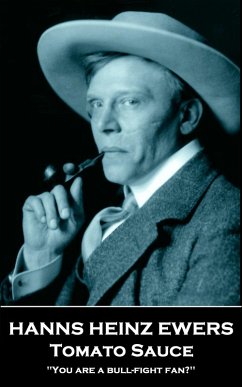Hanns Heinz Ewers was born on 3rd November 1871 in Düsseldorf, Germany.
His first published poem was at 17 on the death, after a reign of only 99 days, of the German Emperor Frederick III.
A stint in the German military was cut short after only 44 days because of his myopia. Writing was to be the way forward for him with a book of satiric verse published in 1901. At the same time he co-founded a literary vaudeville troupe that toured central and eastern Europe before censors and expenses forced its closure. An inveterate traveller he was in South America when the Great War enveloped Europe and he relocated to New York.
From here his story darkens. Although by now a successful and admired author he was arrested in the U S in 1918 as a German Agent on the pretext of his travels and a falsified Swiss passport. Interned, he was released in 1921 and returned to Germany. He claimed only to be raising money for the German Red Cross.
His literary fame is decidedly easier to clarify. His novels beginning with 'The Sorcerer's Apprentice' in 1910 are dark, they bristle with evil intent and are littered with characters who have a dubious moral compass and yet, along with his short stories, are brazen, brilliant feats of literary narrative.
He also wrote and published plays, fairy tales, opera librettos, critical essays and lectured for many years on 'The Religion of Satan' and was one of the first to write scripts for the cinema, which he considered a legitimate art form.
As the Weimar republic began its chaotic death throes Ewers became attracted to the rising Nazi Party. At first he was warmly received despite disagreeing with its anti-semitism (his most famed literary character had a Jewish mistress) and he was even commissioned by Hitler to write a biography of the Nazi martyr Horst Wessel. This together with his own homosexuality culminated with his works being banned in 1934 and his assets and property seized. It took him many years to have the ban lifted. This association rightfully clouds his personal reputation but has meant his literary contributions are also overlooked and neglected.
Hanns Heinz Ewers died of tuberculosis on 12th June 1943 in his Berlin apartment.
His first published poem was at 17 on the death, after a reign of only 99 days, of the German Emperor Frederick III.
A stint in the German military was cut short after only 44 days because of his myopia. Writing was to be the way forward for him with a book of satiric verse published in 1901. At the same time he co-founded a literary vaudeville troupe that toured central and eastern Europe before censors and expenses forced its closure. An inveterate traveller he was in South America when the Great War enveloped Europe and he relocated to New York.
From here his story darkens. Although by now a successful and admired author he was arrested in the U S in 1918 as a German Agent on the pretext of his travels and a falsified Swiss passport. Interned, he was released in 1921 and returned to Germany. He claimed only to be raising money for the German Red Cross.
His literary fame is decidedly easier to clarify. His novels beginning with 'The Sorcerer's Apprentice' in 1910 are dark, they bristle with evil intent and are littered with characters who have a dubious moral compass and yet, along with his short stories, are brazen, brilliant feats of literary narrative.
He also wrote and published plays, fairy tales, opera librettos, critical essays and lectured for many years on 'The Religion of Satan' and was one of the first to write scripts for the cinema, which he considered a legitimate art form.
As the Weimar republic began its chaotic death throes Ewers became attracted to the rising Nazi Party. At first he was warmly received despite disagreeing with its anti-semitism (his most famed literary character had a Jewish mistress) and he was even commissioned by Hitler to write a biography of the Nazi martyr Horst Wessel. This together with his own homosexuality culminated with his works being banned in 1934 and his assets and property seized. It took him many years to have the ban lifted. This association rightfully clouds his personal reputation but has meant his literary contributions are also overlooked and neglected.
Hanns Heinz Ewers died of tuberculosis on 12th June 1943 in his Berlin apartment.
Dieser Download kann aus rechtlichen Gründen nur mit Rechnungsadresse in D ausgeliefert werden.


